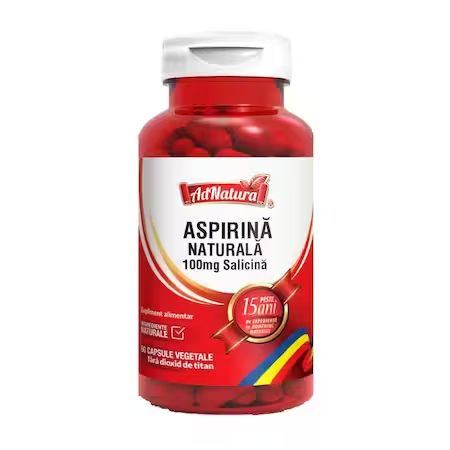

Description
Aspirin Cardio 100 mg, 28 tablets, Bayer
Aspirin Cardio 100 mg inhibits the adhesion and aggregation of blood platelets (platelets) and in this way prevents the formation of blood clots (thrombi) in progress (inhibition of platelet aggregation).
Indications:
- Reducing the risk of mortality in patients with suspected acute myocardial infarction
- Reducing the risk of morbidity and mortality in patients with a history of myocardial infarction
- Secondary prevention of stroke
- Reducing the risk of transient ischemic attacks (TIA) and stroke in patients with TIA
- Risk reduction in patients with stable and unstable angina pectoris
- Thromboembolism prophylaxis after vascular surgery or surgical interventions, for example, PTCA (Percutaneous Transluminal Coronary Angioplasty), CABG (Coronary Bypass), carotid endarterectomy, arterio-venous shunts
- Prophylaxis of deep vein thrombosis and pulmonary embolism after long-term immobilization, for example, after major surgery
- Reduction of the primary risk of myocardial infarction in people with cardiovascular risk factors, for example, diabetes, hyperlipidemia, hypertension, obesity, smoking, advanced age
- Prophylactic inhibition of platelet aggregation in coronary aneurysm.
Composition:
- The active substance is acetylsalicylic acid
- Each gastro-resistant tablet contains acetylsalicylic acid 100 mg
- Core - cellulose powder, corn starch
- Film - copolymer of methacrylic acid-ethyl acrylate 1:1, polysorbate 80, sodium lauryl sulfate, talc, triethyl citrate.
Mode of administration:
- Tablets should be administered after meals and swallowed whole with a sufficient amount of liquid (for example, a glass of water). Always take this medicine exactly as described in this leaflet or as your doctor or pharmacist has told you. Talk to your doctor or pharmacist if you are not sure
- Unstable angina pectoris, prophylaxis of myocardial infarction recurrence, after vascular surgery, prophylaxis of transient ischemic attacks (TIA) and cerebral infarction: the recommended daily dose is one gastro-resistant tablet of Aspirin Cardio 100 mg (equivalent to 100 mg of acetylsalicylic acid per day)
- Acute myocardial infarction: the recommended daily dose is three gastro-resistant tablets of ASPIRIN CARDIO 100 mg (equivalent to 300 mg of acetylsalicylic acid per day)
- Prophylaxis of venous thrombosis and pulmonary embolism: the recommended daily dose is one Aspirin Cardio 100 mg tablet (equivalent to 100 mg acetylsalicylic acid)
- Prophylaxis of coronary vessel thrombosis in patients with multiple risk factors: the recommended daily dose is 1 - 2 Aspirin Cardio 100 mg tablets (equivalent to 1a 100 - 200 mg acetylsalicylic acid) or one ASPIRIN CARDIO 300 mg tablet (equivalent to 300 mg acetylsalicylic acid ) at intervals of 2 days.
- For the treatment of acute myocardial infarction, the first gastro-resistant tablet must be crushed or chewed
- Duration of treatment - it is intended for long-term use. The doctor is the one who must decide on the duration of the treatment
- If you take more Aspirin Cardio 100 mg than you should, you may experience dizziness and ringing in the ears, especially in children and the elderly, which may indicate serious poisoning. Please inform your doctor if you suspect that you have taken an overdose of Aspirin Cardio 100 mg. Your doctor will decide on the necessary measures to be taken depending on the severity of the dose/intoxication
- If you forget to take Aspirin Cardio 100 mg - or you took too little, do not take a double dose next time; simply continue to take the medicine as mentioned in this leaflet or as prescribed by your doctor
- If you stop taking Aspirin Cardio 100 mg - do not stop treatment with Aspirin Cardio 100 mg without consulting your doctor
- If you have any additional questions about this medicine, ask your doctor or pharmacist.
Possible side effects:
- Like all medicines, Aspirin Cardio 100 mg can cause side effects, although not everybody gets them
- The adverse reactions listed below are based on spontaneous post-marketing reports with all formulations of acetylsalicylic acid, including short-term and long-term oral therapy.
- Disorders of the upper and lower gastrointestinal tract have been observed, such as common signs and symptoms of dyspepsia, gastrointestinal and abdominal pain, rarely gastrointestinal inflammation and gastrointestinal ulcer, with the potential to lead to hemorrhagic or perforated gastrointestinal ulcer with laboratory tests and signs respectively clinical and specific symptoms
- Due to its inhibitory effect on platelets, acetylsalicylic acid may be associated with an increased risk of bleeding. Bleeding such as perioperative bleeding, haematomas, epistaxis (nosebleeds), urogenital bleeding and gingival bleeding have been observed
- Very rare serious bleedings have been observed, such as gastrointestinal tract hemorrhages, cerebral hemorrhages (especially in patients with uncontrolled arterial hypertension and/or concomitant administration of antihemostatic agents) rarely and very rarely. These, in unique cases, can endanger life
- Hemorrhage can lead to acute and chronic anemia/iron deficiency anemia (as a result of microbleeding, for example), with symptoms and clinical signs in laboratory test results, respectively, asthenia, pallor and hypoperfusion
- Cases of hemolysis and hemolytic anemia have been reported in patients with severe forms of glucose-6-phosphate dehydrogenase (G6PD) deficiency.
- Hypersensitivity reactions have been observed in laboratory tests and the respective clinical manifestations of mild to moderate asthma syndrome that could affect the skin, respiratory tract, gastrointestinal tract, and cardiovascular system, including symptoms such as skin rashes, urticaria, edema, itching, rhinitis, nasal congestion, cardio-respiratory distress, and very rarely, severe reactions, including anaphylactic shock
- Transient liver failure with increased liver transaminase levels has been reported very rarely. Dizziness and tinnitus have been reported and may indicate an overdose
- If any adverse reaction becomes serious or you notice any other adverse reaction not mentioned in this leaflet, please tell your doctor or pharmacist.
Presentation: 28 tablets
Instruction
Features
| Product code | 60495 |
| Category | Cardiovascular diseases, Over-the-Counter medicines (OTC) |
| Product line | Aspirin |
| Brand | Bayer |
| Range | Cardio |
| Quantity | 28 |
| Dose | 100 mg |
Reviews
Aspirin Cardio 100mg, 28 tablets, Bayer
Thank you for your review! It has been sent for moderation.





















































































 Description
Description 





